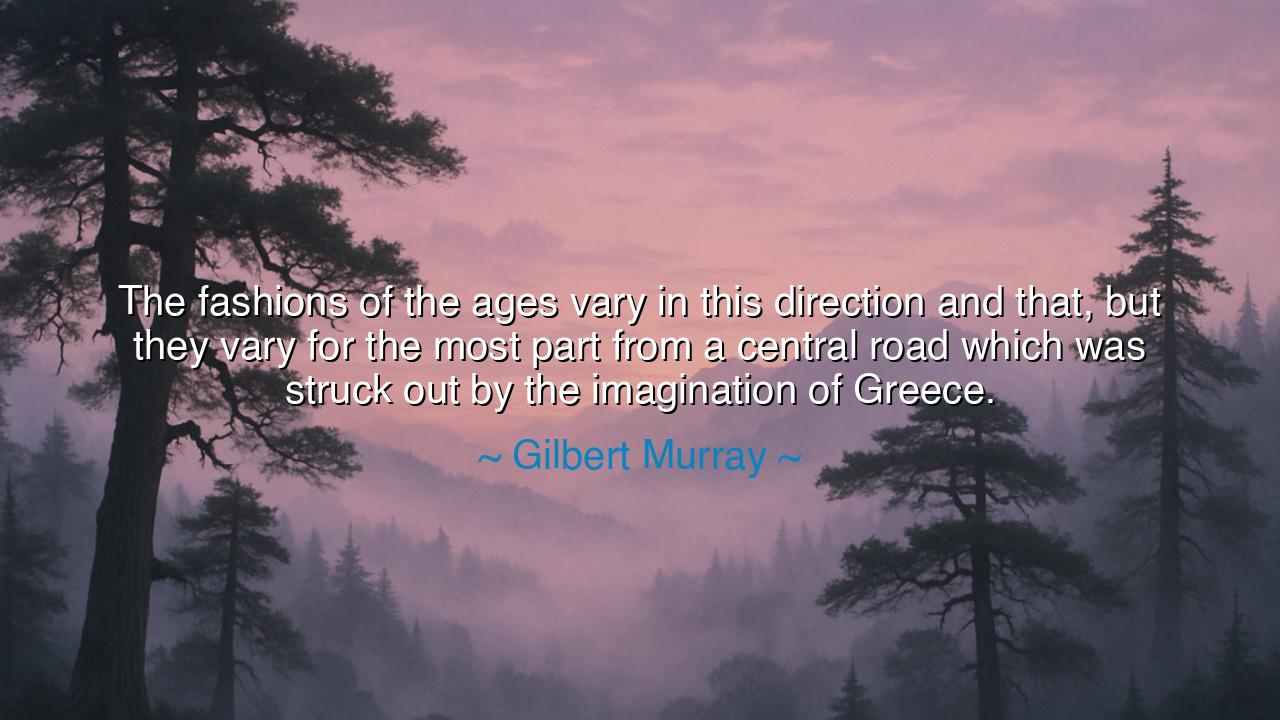
The fashions of the ages vary in this direction and that, but
The fashions of the ages vary in this direction and that, but they vary for the most part from a central road which was struck out by the imagination of Greece.






"The fashions of the ages vary in this direction and that, but they vary for the most part from a central road which was struck out by the imagination of Greece." These words of Gilbert Murray speak to the enduring influence of Greek thought, culture, and creativity upon the world. The central idea Murray conveys is that while the styles and fashions of each era—whether in art, literature, or philosophy—may change and evolve, they all stem from the wellspring of imagination that Greece first poured forth. The Greeks, through their mastery of the human spirit, beauty, and reason, forged paths that many subsequent cultures followed, even when their paths seemed divergent. Greek imagination carved the road that countless generations would walk, shaping not only their own societies but the very ways in which the world conceived beauty, morality, and art.
In the ancient world, the Greeks were the shining example of human potential—both intellectually and artistically. Their contributions in the realms of philosophy, politics, and art were profound and far-reaching. Plato, the philosopher, shaped our understanding of justice, ethics, and reality; Homer set the standards for epic poetry; and Sophocles gave birth to the enduring power of tragedy. These intellectual giants, along with many others, defined an era where the human imagination was freed to roam the vast expanse of possibility, creating a blueprint for understanding the world that still reverberates today. Murray's words remind us that the imagination of Greece was the spark that set all other cultural fires ablaze, and from this spark, the flames of human achievement would continue to grow and evolve.
Consider the example of Alexander the Great, a man who sought not only to expand his empire but to spread the cultural achievements of Greece to the far corners of the known world. When Alexander ventured eastward, he didn’t just seek land or riches; he sought to bring the Greek imagination with him—philosophy, art, and even the ideals of democracy were carried with his legions into Egypt, Persia, and beyond. The cities that he founded, such as Alexandria, became centers of learning, where the Greek model of intellectual pursuit and creative expression took root in distant lands. Alexander’s conquests were as much about spreading Greek ideals as they were about expanding his own power. Through him, the imagination of Greece was forever woven into the fabric of the world.
The influence of Greek imagination can also be seen in the enduring legacy of Greek architecture. The Parthenon, a temple dedicated to Athena, stands as a testament to the principles of proportion, harmony, and beauty that the Greeks held dear. The classical orders of architecture—the Doric, Ionic, and Corinthian—were not merely about creating structures but about creating spaces that evoked balance and order, key concepts of Greek philosophy. These principles of design influenced generations of builders, from the Romans to the Renaissance architects such as Michelangelo and Palladio, and continue to shape architecture to this day. Murray suggests that the road the Greeks paved in their pursuit of beauty and order remains the path by which subsequent generations have found their way.
Similarly, the Greek ideals of drama and theater have shaped countless traditions in performance art. The concept of tragedy, introduced by Aeschylus and Sophocles, laid the foundation for modern theater. These ancient playwrights used their imagination not just to entertain, but to ask profound questions about human nature, morality, and fate. Their works explored the depths of human experience, probing the consequences of pride, the complexity of love, and the inevitability of death. In this way, the Greek imagination provided a framework for understanding the human condition—a framework that would inspire not just subsequent playwrights but thinkers in psychology, literature, and sociology.
Murray's assertion reminds us that while the world may change, the ideas and concepts birthed by Greece continue to reverberate throughout history. From the Renaissance to the Enlightenment, Western culture has continually returned to Greek thought to reimagine its own path. The foundational questions about justice, the ideal state, the nature of the soul, and the purpose of art are all rooted in Greek philosophy and have shaped the very structure of modern Western civilization. The imagination of Greece was not a passing trend, but a central, eternal force that continues to shape our world, our thinking, and our expressions of beauty and truth.
The lesson we can take from Gilbert Murray’s words is one of honoring the past while moving forward. We must recognize the profound impact of the Greek imagination on the development of human civilization, and seek to continue this legacy in our own lives. The challenge for us today is not to cling to the old ways but to build upon them, to expand the road the Greeks began, and create new spaces for creativity, reason, and beauty to flourish. Whether in art, philosophy, politics, or science, we are called to engage with the timeless wisdom of the Greeks and carry it into the future, not as a relic of the past but as a living, breathing force that will continue to shape the world for generations to come.
Let us, therefore, live with the understanding that the imagination of those who came before us is not a burden but a privilege. We walk upon the road that the Greeks paved, and it is now our duty to continue forging that path, guided by the same principles of beauty, truth, and human potential. Just as Alexander spread the knowledge of Greece, we too must spread the light of imagination, ensuring that the central road of wisdom and creativity remains open for those who will follow.






AAdministratorAdministrator
Welcome, honored guests. Please leave a comment, we will respond soon